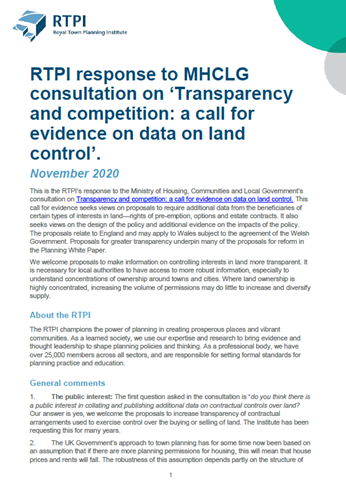RTPI response to MHCLG consultation on ‘Transparency and competition: a call for evidence on data on land control’
November 2020
This is the RTPI’s response to the Ministry of Housing, Communities and Local Government’s consultation on Transparency and competition: a call for evidence on data on land control.
This call for evidence seeks views on proposals to require additional data from the beneficiaries of certain types of interests in land—rights of pre-emption, options and estate contracts. It also seeks views on the design of the policy and additional evidence on the impacts of the policy. The proposals relate to England and may apply to Wales subject to the agreement of the Welsh Government. Proposals for greater transparency underpin many of the proposals for reform in the Planning White Paper.
We welcome proposals to make information on controlling interests in land more transparent. It is necessary for local authorities to have access to more robust information, especially to understand concentrations of ownership around towns and cities. Where land ownership is highly concentrated, increasing the volume of permissions may do little to increase and diversify supply.
Read the RTPI's full response below or download it in PDF here.
About the RTPI
The RTPI champions the power of planning in creating prosperous places and vibrant communities. As a learned society, we use our expertise and research to bring evidence and thought leadership to shape planning policies and thinking. As a professional body, we have over 25,000 members across all sectors, and are responsible for setting formal standards for planning practice and education.
General comments
- The public interest: The first question asked in the consultation is “do you think there is a public interest in collating and publishing additional data on contractual controls over land? Our answer is yes, we welcome the proposals to increase transparency of contractual arrangements used to exercise control over the buying or selling of land. The Institute has been requesting this for many years.
- The UK Government’s approach to town planning has for some time now been based on an assumption that if there are more planning permissions for housing, this will mean that house prices and rents will fall. The robustness of this assumption depends partly on the structure of land ownership in England. If land ownership in key sustainable locations around towns and cities where people want to live is highly concentrated, then simply granting more permissions may not translate into greater affordability. We welcome any changes which make it easier to query land ownership data freely and in aggregate so as to enable better debates on this critical question.
- Clarity: Many of the issues raised in the consultation are magnified by the lack of transparency regarding land control in England.. If communities do not know how land around them is owned and controlled, then they can find the planning process confusing.
- The Institute has been requesting greater transparency for some time. RTPI research on delivering large-scale housing in 2013 (and quoted in this call for evidence) recommended that there should be public access to information on who owns land and who owns options on land. This research explained why land transparency is important and how different stakeholders could benefit from greater openness:
- Local Planning Authorities (LPAs) would be able to see who owns strategically important sites;
- Developers would then be able to demonstrate how much land they have bought and;
- The public would be able to see if private owners are stalling development. This is particularly the case for town and parish councils (and neighbourhood forums) who are statutory consultees on planning applications for their area. For large sites, in particular there may be several or many landowners and persons with an interest or option in local land made available for sale or lease.
- Our Paper on Better Planning for Housing Affordability, published in 2017, outlined that the “financialisation of the land market prevents land coming forward for development and can in some situations result in landowners being the greatest beneficiaries of residential development – not developers, communities, or central or local government”.
- SME housebuilders: The call for evidence highlights the lack of transparency on land ownership as a specific problem for small and medium sized housebuilders. It is often too expensive for a SME housebuilder to identify the owners of suitable building land and sites for development, which may involve many potential enquiries and Land Registry fees. However, large companies may find it easier to afford the Land Registry fees. This is one factor, which has created an imbalance of information between larger and smaller housebuilders.
- Digital focus: for LPAs, the new proposals provide an opportunity to increase the accuracy of data on planning applications. Increasing the information that applicants and their agents provide is can improve the link between the data required on a planning application form and that contained in the Land Registry entry for the application site. This would support the Government’s ambition to improve the use of technology within the planning system.
- Rights of pre-emption and options: We broadly welcome proposals for greater transparency on rights of pre-emption and options. Importantly, the issue is not just about land ownership but also relates to knowing which developers have bought options on the land. Land options give the purchaser (a developer) the right to buy outright once planning permission has been granted. An option on land affects the market without any transaction of the land having taken place. Therefore, both transparency of land ownership AND knowing who owns the option during the planning process is important
-
- For example, a landowner may have entered into a conditional contract, option or right of pre-emption that gives a prospective developer the rights to acquire and develop the land in question. Notice of such an agreement can, and often is, recorded on the landowner’s title to protect it. However, there is often very little information recorded on the Land Registry records about the person with the benefit of the agreement or its terms. These types of agreement can often give the developer control over the current use and future development of the land affected.
- In this context, government believes there is a wider public interest in opening up access to information about land ownership. However, without better data on contractual controls, members of the public cannot fully understand who exercises the control over land, which may be more important in their local area than knowing who the legal owner is (who may for example be a local landowner or farmer).
The Public Interest
Q1. Do you think there is a public interest in collating and publishing additional data on contractual controls over land?
Please give reasons.
Yes.
We welcome the Government’s proposal to collate, and make publicly available, additional data on contractual controls; this is a positive approach for improving the Land Registry. The Institute has previously outlined the multiple benefits for the public interest from greater transparency, and these are collated in the general comments of section of this response.
The Government’s proposal would also facilitate a more efficient land and property market, primarily because it provides market participants with useful data to make informed decisions more quickly. In some instances, for example, a third party may unwittingly seek to purchase land which is already subject to an option agreement, leading to unnecessary and protracted discussions. This slows down the land transaction process, which subsequently affects the development timeline.
However, these proposals may apply more widely than the government intends. For example, a developer may already have outline planning permission for a new development (such as a retail park). The developer then enters into agreements with tenants for leases or sales of units that are conditional on the grant of reserved matters or the subsequent full planning permission. These examples could potentially be subject to the new disclosure regime as well if tenants wanted to protect their agreements for lease or sale agreement. More work is required prior to implementation to ensure that the new land control provisions are targeted at the development industry and not those who enter into agreements with them.
Rights of pre-emption and options
Q2. (a) Do you think that the definition of rights of pre-emption and land options in the Finance Act 2003, s. 4616 is a suitable basis for defining rights of pre-emption and options that will be subject to additional data requirements? Please give reasons.
No comment – this is a legal question.
(b) Is the exemption for options and rights of pre-emption for the purchase or lease of residential property for use as a domestic residence sufficient to cover:
• options relating to the provision of occupational housing and
• shared ownership schemes? Please give reasons.
Yes, and this should be clarified in the legislation.
(c) Are there any types of rights of pre-emption or options that do not fall under the scope of the definition in the Finance Act 2003, s. 46? Please give reasons
No comment.
Estate contracts
Q3. Are the tests set out above sufficient to avoid inadvertently capturing transactions not related to the development of land? If not, please give examples.
The Government’s proposal is to apply a completion date and conditionality test, in order to target a narrow subset of contracts and limit the scope of additional data requirements. In principle, we agree that a scope needs to be determined to make the system effective. However, care is needed over the simplicity of the proposed tests and whether they give rise to loopholes, which could undermine the system.
Our view is that the tests should be reviewed more carefully, and perhaps a different approach considered, to ensure that no targeted contracts inadvertently fall outside the parameters of the tests.
Other contractual controls
Q4.
(a) Are there any contractual arrangements by which control can be exercised over the purchase or sale of land, which should be included within this regime and which are not rights of pre-emption, options or estate contracts? Please give examples.
Not that we are aware of.
(b) If so, do you consider them (i) an interest in land (interests that are capable of being protected by way of a notice on the land register); or (ii) not an interest in land? Please give reasons.
Not applicable.
Data requirements
Q5. a) Are there any data fields that (i) should; or (ii) should not be subject to additional data requirements? Please give reasons.
None additional to the fields proposed in Annex A.
(b) Are there any data fields that (i) should; or (ii) should not be placed on the land register? Please give reasons.
None additional to the fields proposed in Annex A.
(c) Are there any data fields that (i) should; or (ii) should not be included in a contractual control interest dataset? Please give reasons.
None additional to the fields proposed in Annex A.
(d) Are there other data fields that should be collected? Please give reasons.
None additional to the fields proposed in Annex A.
(e) Do any of the data fields give rise to privacy risks? Please give reasons
Not in our view. We agree with the proposed approach to protect financially sensitive information and personal details.
Contractual conditions
Q6. (a) Are there any data fields that (i) should; or (ii) should not be subject to additional data requirements? Please give reasons.
None additional to the fields proposed.
(b) Are there any data fields that (i) should; or (ii) should not be placed on the land register? Please give reasons.
No.
(c) Are there any data fields that (i) should; or (ii) should not be included in a contractual control interest dataset? Please give reasons.
No. The proposed data fields are publicly available through the documentation submitted and approved to obtain planning permission.
Legal Entity Identifiers
Q7. Should legal entities that are beneficiaries of contractual arrangements be asked to provide a Legal Entity Identifier? Please give reasons.
No comment.
Data currency
Q8.
(a) Should beneficiaries be required to provide updated information on:
• variation • termination, or • assignment or novation? Please give reasons.
Yes. It is essential that records are robust and regularly updated; otherwise it renders the available information outdated or void. Over time, any lack of accuracy could undermine the system and the market may lose confidence in the data collated.
(b) Are there other ways in which data currency could be maintained?
No comment.
Accounting treatment
Q9. If your organisation is required to produce annual accounts, when are: (i) rights of preemption; (ii) options; and (iii) estate contracts recognised on the balance sheet? Please give reasons and state the accounting standard used.
No answer provided.
Existing contractual control interests
Q10. (a) Should the requirement to supply additional data be limited to: (i) new contractual control interests only; or (ii) all extant interests? Please give reasons.
The requirement to supply additional data should be limited to new contractual interests only. Collating extant data could be time inefficient and result in inaccurate data that is difficult to track and update. However, focusing on new interests ensures that the required data is collated at the point of contract exchange and no further due diligence is required.
(b) How long should beneficiaries of an extant contractual control interests that is varied, assigned or novated be given to provide additional data before losing protection: (i) three months; or six months?
The time period should reflect how long it would take the Land Registry to update its records. For example, if the Land Registry can update in real time, then the beneficiaries could be allowed longer (e.g. 6 months). However, if there is an additional lead-time for the data to be reflected on Land Registry, then beneficiaries should be required to provide this data in a shorter period.
Current beneficiaries
Q11: What are the best ways of informing current beneficiaries of the need to provide additional data? Please give reasons
It may be beneficial to use solicitors as they play a key role in drafting, negotiating and completing contracts.
A digital process?
Q12. Should the provision of additional data prior to the application process for an agreed notice be exclusively digital (with assisted digital support if required)? Please give reasons.
Yes, provided this process is made accessible and user friendly. This supports the Government’s ambition in the White Paper for a more digitised approach to the planning system.
Certification
Q13. Should beneficiaries of contractual control interests with a duty to produce annual accounts be required to certify that all relevant interests have been noted? Please give reasons.
Yes. This step could provide a necessary means of tracking interests. It also facilitates transparency and consistency across different areas (i.e. the same land interests are declared in annual accounts).
Restrictions
Q14: (a) Should beneficiaries of contractual control interests be required to obtain an agreed notice before they could apply for a restriction? Please give reasons.
No comment.
(b) Should the protections of restrictions placed on an un-noted contractual control interest be (i) limited; or (ii) removed? Please give reasons.
No comment.
(c) If the Government accepts the Law Commission’s recommendation on restrictions, should contractual control interest fall into the category of interest that cannot be capable of protection by way of a restriction? Please give reasons
No comment.
Alternative options
Q15: (a) Should a mandatory system be introduced whereby the beneficiary of a contractual control interest would, where it is possible to do so, be required to note their interest with HMLR? Please give reasons.
Yes. A mandatory system would be more efficient than relying on action based on self-interest (i.e. minimising financial and legal risk). This would ensure that all relevant interests are declared and help to build a truly transparent system.
(b) If so, how should the system be enforced? Please give reasons
This could be enacted through legislation, where failure to note an interest could lead to legal risk.
Current practice
Q16: (a) If you are a beneficiary of a right of pre-emption, option or estate contract, please indicate how you protect your interest.
No comment.
(b) What factors influence your choice? Please give reasons.
No comment.
Data collation and provision
Q17: (a) Are there any data fields in Annex A that contracting parties would not have readily to hand? Please list them.
Not in our view.
(b) What is your estimate of the time needed to provide the additional data?
No comment.
(c) Does your entity hold a Legal Entity Identifier?
No comment.
Data currency
Q18: What additional work (over and above the time and cost of preparing annual accounts) would your organisation need to undertake to identify contractual control interests that needed to be updated?
No comment.
Certification
Q19: What additional work (over and above the time and cost of preparing annual accounts) would your organisation need to undertake to certify in your organisation’s annual accounts that all relevant contractual control interests had been noted on the land register where the land is registered?
No comment.
Economic impact
Question 20: What impact, if any, do you think that these proposals will have on the English land market (residential and commercial)? Please describe the effects and provide evidence.
The proposals provide more transparency, which could provide more certainty for market participants. This reduces the risk of transactions falling through after discussions have commenced. This contributes to a more efficient land market, where transactions complete more quickly and development land becomes available for development with less delay.
Costs
Q21. What impact, if any, do you think that these proposals will have on the costs incurred by participants in the English land market (residential and commercial)? Please describe the effects and provide evidence.
We understand that the costs on the market participants would be minimal, specifically because the information required is typically readily available. There may be some administrative costs attached to compiling the data, but not substantive costs in our view.
Identifying and understanding contractual control interests
Q22. (a) Can you estimate the amount of (i) time and (ii) money that you have spent on identifying land affected by a contractual control interest?
No comment.
(b) What is the source of your information?
No comment.
(c) Can you estimate the amount of (i) time and (ii) money that you have spent on seeking professional advice on exactly how a contractual control interest affects a piece of land?
No comment.
Market impact
Q23.
(a) If you are a small or medium enterprise (SME) builder or developer, do contractual controls hinder your ability to assess the viability of a local market? Please give reasons.
No comment.
(b) If you are an SME builder or developer, does a lack of freely accessible and understandable data act as a barrier to you entering the market? Please give reasons.
No comment.
Trust in the planning system
Q24. (a) Do you think that a lack of accessible and understandable data on contractual controls makes it more difficult for local communities to understand the likely pattern of development? Please give reasons.
Yes – a more transparent system allows local communities to understand which land parcels are likely to come forward quickly for development.
(b) If so, to what extent does it undermine trust and confidence in the planning system: (i) not much; (ii) somewhat; (ii) a great deal? Please give reasons
As we set out in the introduction, the issue of land ownership is critical to planning policy – albeit a rather neglected aspect of the discussions around it. There has been considerable concern on the part of the public that simply granting more planning permissions has not resulted in greater access to housing, especially for those on lower incomes. If there is greater public and political awareness of how land ownership interacts with the housing market, then it would enable greater public confidence in the planning system.
Public Sector Equality Duty
Q25. What impact, if any, do you think that these proposals will have on people who share protected characteristics20? Please describe the effects and provide evidence.
None perceived. The Government does not propose to collect data on protected characteristics.
Wales
Q26. Should a contractual control interest regime be extended to Wales? Please give reasons.
No comment this should be a matter for the Welsh Government.



